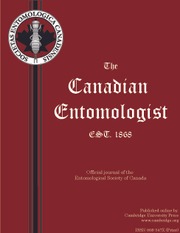Crossref Citations
This article has been cited by the following publications. This list is generated based on data provided by
Crossref.
Tingle, F. C.
and
Mitchell, E. R.
1984.
Aqueous extracts from indigenous plants as oviposition deterrents forHeliothis virescens (F.).
Journal of Chemical Ecology,
Vol. 10,
Issue. 1,
p.
101.
REYNOLDS, T.
1985.
The compounds in Aloë leaf exudates: a review.
Botanical Journal of the Linnean Society,
Vol. 90,
Issue. 3,
p.
157.
Lewis, A. C.
and
van Emden, H. F.
1986.
Insect-Plant Interactions.
p.
95.
VAN DEN BERG, A.J.J.
and
LABADIE, R.P.
1989.
Plant Phenolics.
Vol. 1,
Issue. ,
p.
451.
Hare, J. Daniel
1998.
Methods in Chemical Ecology Volume 2.
p.
212.
Dowd, Patrick
2001.
Microbial Biopesticides.
Izhaki, Ido
2002.
Emodin – a secondary metabolite with multiple ecological functions in higher plants.
New Phytologist,
Vol. 155,
Issue. 2,
p.
205.
Tsahar, Ella
Friedman, Jacob
and
Izhaki, Ido
2002.
Impact on fruit removal and seed predation of a secondary metabolite, emodin, in Rhamnus alaternus fruit pulp.
Oikos,
Vol. 99,
Issue. 2,
p.
290.
Izhaki, Ido
Tsahar, Ella
Paluy, Irena
and
Friedman, Jacob
2002.
Within population variation and interrelationships between morphology, nutritional content, and secondary compounds of Rhamnus alaternus fruits.
New Phytologist,
Vol. 156,
Issue. 2,
p.
217.
Frappier, Brian
and
Eckert, Robert T.
2003.
Utilizing the USDA PLANTS database to predict exotic woody plant invasiveness in New Hampshire.
Forest Ecology and Management,
Vol. 185,
Issue. 1-2,
p.
207.
Yang, Young-Cheol
Lim, Mi-Youn
and
Lee, Hoi-Seon
2003.
Emodin Isolated from Cassia obtusifolia (Leguminosae) Seed Shows Larvicidal Activity against Three Mosquito Species.
Journal of Agricultural and Food Chemistry,
Vol. 51,
Issue. 26,
p.
7629.
Bañuelos, María-José
Sierra, Marta
and
Obeso, José-Ramón
2004.
Sex, secondary compounds and asymmetry. Effects on plant–herbivore interaction in a dioecious shrub.
Acta Oecologica,
Vol. 25,
Issue. 3,
p.
151.
Johnson, Vanessa S.
Litvaitis, John A.
Lee, Thomas D.
and
Frey, Serita D.
2006.
The role of spatial and temporal scale in colonization and spread of invasive shrubs in early successional habitats.
Forest Ecology and Management,
Vol. 228,
Issue. 1-3,
p.
124.
Delanoy, Luc
and
Archibold, O. W.
2007.
Efficacy of Control Measures for European Buckthorn (Rhamnus cathartica L.) in Saskatchewan.
Environmental Management,
Vol. 40,
Issue. 4,
p.
709.
Knight, Kathleen S.
Kurylo, Jessica S.
Endress, Anton G.
Stewart, J. Ryan
and
Reich, Peter B.
2007.
Ecology and ecosystem impacts of common buckthorn (Rhamnus cathartica): a review.
Biological Invasions,
Vol. 9,
Issue. 8,
p.
925.
Yang, Xiaojun
Yang, Lijun
Wang, Shaonan
Yu, Dazhao
and
Ni, Hanwen
2007.
Synergistic interaction of physcion and chrysophanol on plant powdery mildew.
Pest Management Science,
Vol. 63,
Issue. 5,
p.
511.
Ahn, Jun-Young
Lee, Joon-Yeop
Yang, Eun-Ju
Lee, Young-Jin
Koo, Kyung-Bon
Song, Kyung-Sik
and
Lee, Kyeong-Yeoll
2013.
Mosquitocidal activity of anthraquinones isolated from symbiotic bacteria Photorhabdus of entomopathogenic nematode.
Journal of Asia-Pacific Entomology,
Vol. 16,
Issue. 3,
p.
317.
Sacerdote, Allison B.
and
King, Richard B.
2014.
Direct Effects of an Invasive European Buckthorn Metabolite on Embryo Survival and Development inXenopus laevisandPseudacris triseriata.
Journal of Herpetology,
Vol. 48,
Issue. 1,
p.
51.
Grunzweig, L.
Spiering, D. J.
Labatore, A.
and
Warren, R. J.
2015.
Non-native plant invader renders suitable habitat unsuitable.
Arthropod-Plant Interactions,
Vol. 9,
Issue. 6,
p.
577.
Schuh, M.
and
Larsen, K. J.
2015.
Rhamnus cathartica (Rosales: Rhamnaceae) Invasion Reduces Ground-Dwelling Insect Abundance and Diversity in Northeast Iowa Forests.
Environmental Entomology,
Vol. 44,
Issue. 3,
p.
647.


